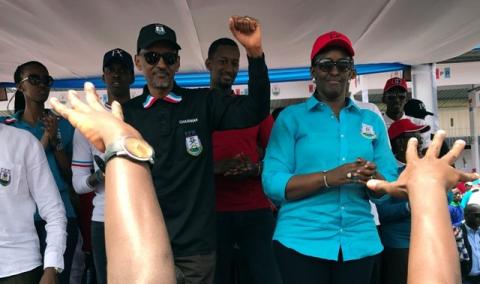Advertisement
Rwanda's Kagame predicts clean sweep to third presidential term
KIGALI (Reuters) - Rwandan President Paul Kagame, already in power for 17 years, predicted on Monday he would win overwhelming popular backing for a third term in elections this week, brushing off accusations of stifling political debate.
Kagame is able to run for the third term only after constitutional changes were approved in a 2015 referendum by what the opposition and Western diplomats described as a suspiciously high 98 percent vote.
Appearing in one of his last rallies before Friday's presidential elections, Kagame told hundreds of cheering supporters of his Rwanda Patriotic Front that victory would ensure economic growth in the tiny East African nation.
"From August 4, we will have seven years to achieve more development," the 59-year old told the crowd gathered along the slopes of hills north of the capital Kigali.
"Considering the might of the Rwanda Patriotic Front, combined with other political parties in the coalition, that is almost 100 percent (victory)," said Kagame.
Kagame restored stability to Rwanda after its 1994 genocide, presiding over rapid economic growth and a relatively corruption-free government. However, accusations of foulplay have marred the run-up to the polls, which activists say will take place in a climate of fear.
"Rwanda's history of political repression, attacks on opposition figures and dissenting voices ... stifles political debate and makes those who might speak out think twice before taking the risk," said Amnesty International's official for Africa, Muthoni Wanyeki, in a report earlier this month.
The constitutional changes could technically allow Kagame to rule until 2034, when he would turn 76, but one supporter said he should be content with one more, seven-year term.
"If elected, he should step down after this term instead of waiting until he is no longer popular. This could put our country back to war," said Ngerageze Anastase, a farmer attending the rally. "His predecessors clung on to power and it led to killings. He should avoid it."
Kagame's critics believe economic progress has come at the expense of civil liberties and media freedoms. Some of his political opponents were killed after they fled abroad, in cases that remain unsolved. The government denies any involvement.
Some people at the rally said they were coerced into attending. "The authorities woke us up at 3 a.m. and we had to come," Jean Pierre Ngarambe, a 52-year old farmer, told Reuters. "They warned us that whoever refused would be punished."
(Writing by Aaron Maasho; Editing by David Stamp)



















Add new comment